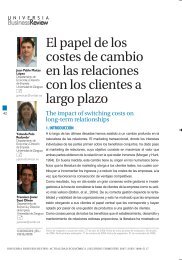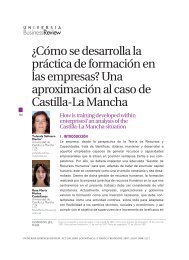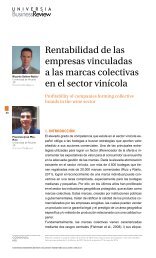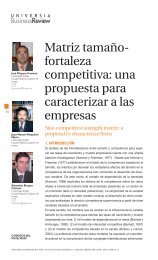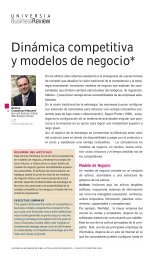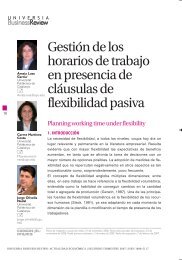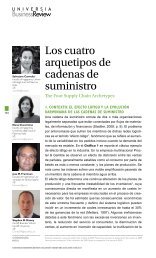ubr-universia-business-review
ubr-universia-business-review
ubr-universia-business-review
- No tags were found...
Create successful ePaper yourself
Turn your PDF publications into a flip-book with our unique Google optimized e-Paper software.
69<br />
RESUMEN DEL ARTÍCULO<br />
El objetivo del trabajo consiste en analizar la rentabilidad de las empresas que integran una<br />
marca colectiva en el sector vinícola español. El supuesto básico es que la marca colectiva<br />
puede explicar la rentabilidad de las bodegas, porque la reputación colectiva es una señal<br />
de calidad que reduce las percepciones de riesgo del consumidor. Los resultados obtenidos<br />
evidencian que sólo algunas marcas colectivas tienen un efecto positivo en la rentabilidad<br />
de las bodegas en relación con las no acogidas a dichas marcas colectivas. Asimismo, la<br />
rentabilidad viene asociada positivamente a la diversificación de la bodega en dos o más<br />
marcas colectivas.<br />
EXECUTIVE SUMMARY<br />
The aim of this study is to analyze the profitability of companies forming collective brands<br />
in the Spanish wine sector. The central hypothesis is that collective brands may explain the<br />
profitability of their member wineries as collective reputation is a sign of quality that reduces<br />
consumer risk perceptions. The results obtained show that only some specific collective<br />
brands have a positive effect on the profitability of the wineries compared to those wineries<br />
that do not belong to these collective brands. Further, profitability is positively related to<br />
diversification into two or more collective brands.<br />
UNIVERSIA BUSINESS REVIEW | SEGUNDO trimestre 2013 | ISSN: 1698-5117



